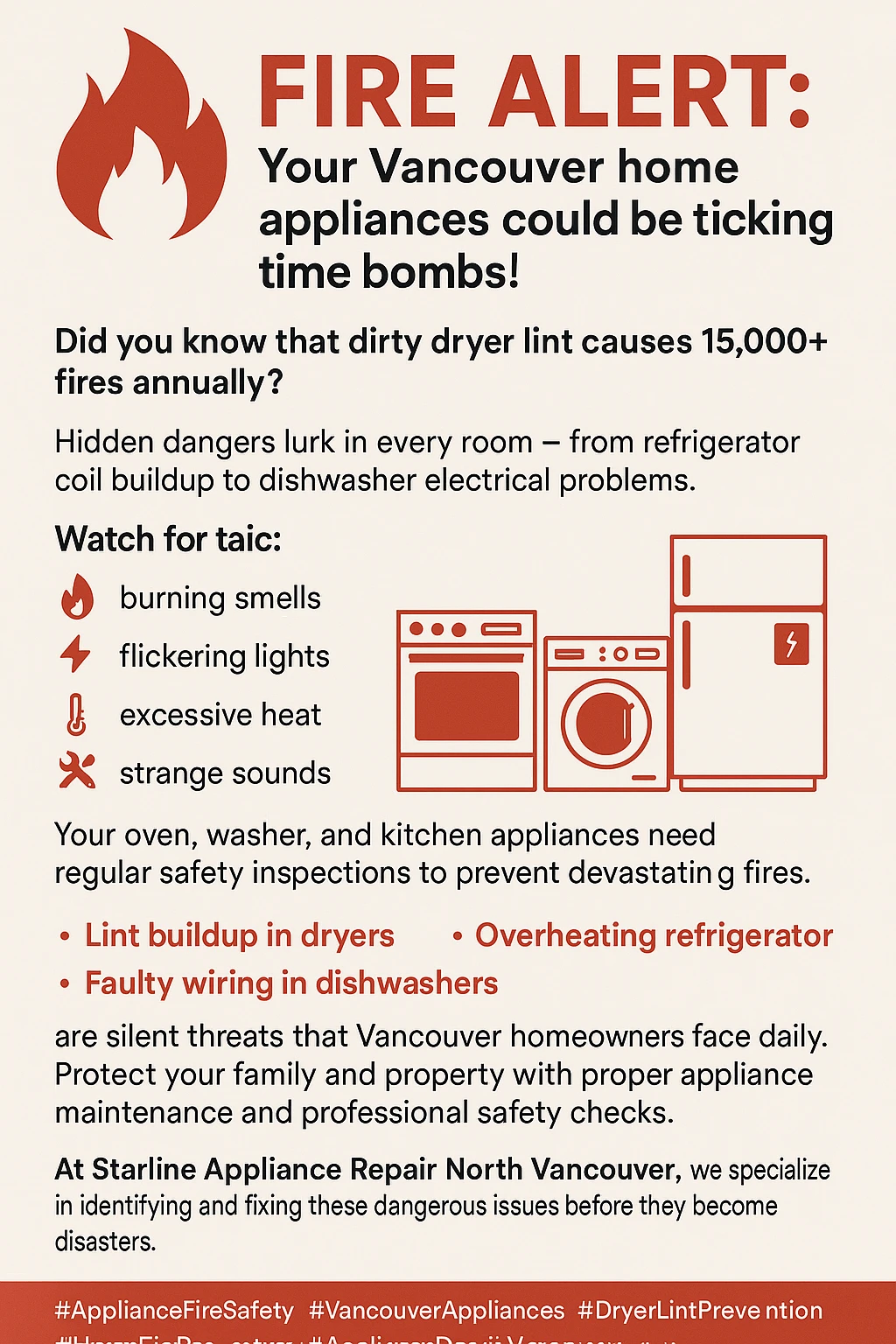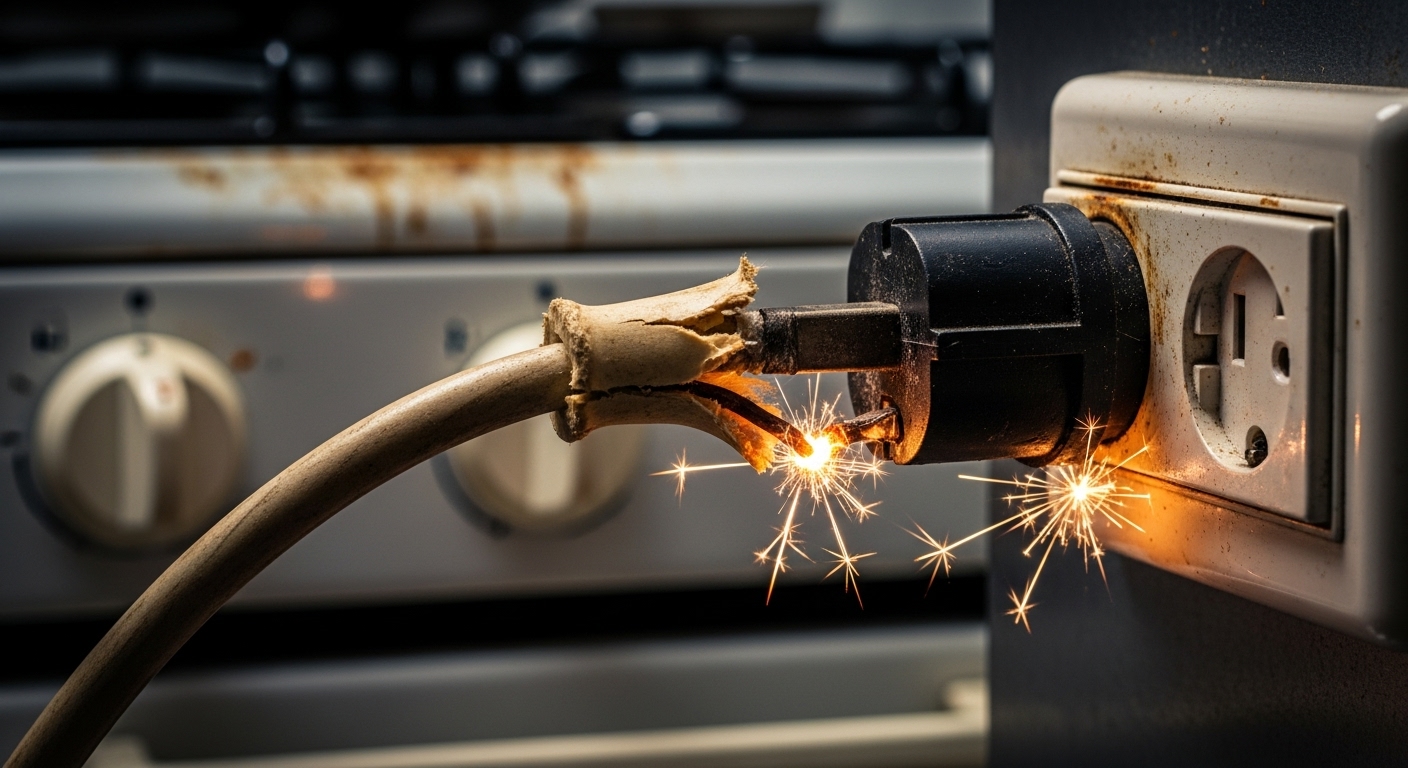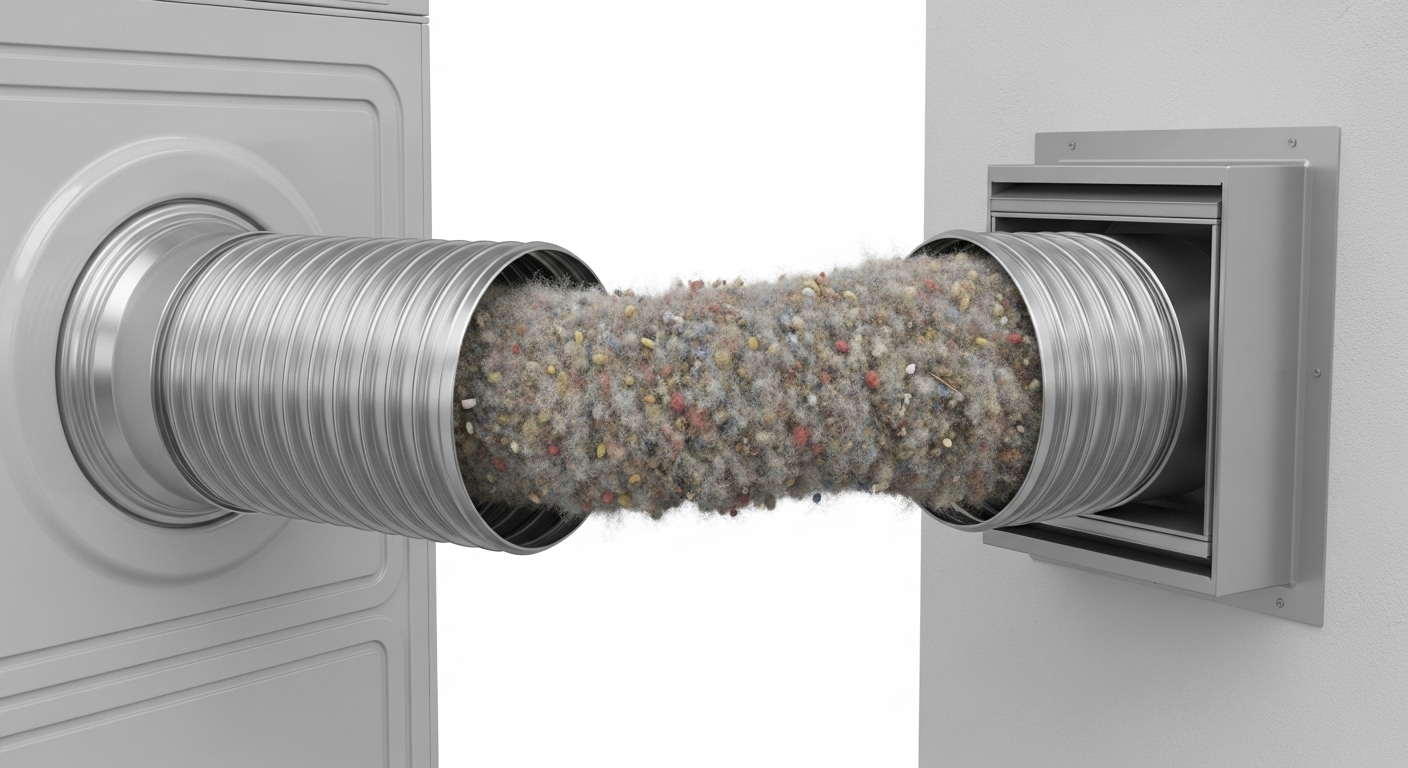Hidden Appliance Fire Hazards in Vancouver Homes: Lint Buildup, Electrical Issues, and Maintenance Red Flags Every Homeowner Must Know
Worried about potential appliance fire hazards lurking in your Vancouver home? Every year, faulty appliances cause thousands of devastating house fires across North America, with Vancouver Fire Rescue Services alone reporting 4,309 fires in 2023 – many of which could have been prevented with proper appliance safety knowledge.
Picture this: you’re settling in for a cozy evening when you catch a whiff of something burning. Your first instinct might be to check the stove, but what about that dryer you started an hour ago? Or the refrigerator that’s been running a little louder lately? The truth is, our most trusted household companions can become silent fire hazards when we least expect it.
As a Vancouver homeowner, you’re dealing with unique challenges that make appliance fire prevention even more critical. From coastal humidity affecting electrical components to the mix of older heritage homes and modern appliances creating varying risk levels, our city presents specific dangers that generic safety guides often miss. What’s particularly alarming is that kitchen ovens are responsible for over 50% of domestic appliance fires, while dryers cause approximately 15,500 home structure fires annually across North America.
The good news? Most of these fires are completely preventable. Regular lint removal and electrical cord inspection can prevent up to 80% of common appliance fires, and recognizing the warning signs early can save both your property and your life. Let’s dive into the hidden dangers lurking in your Vancouver home and arm you with the knowledge to spot trouble before it strikes.
Key Outtakes:
- Vancouver Fire Rescue Services reported 4,309 fires in 2023, with kitchen ovens causing over 50% of domestic appliance fires in Canadian homes
- Dryer fires account for 15,500 annual home structure fires, resulting in $192 million in property damage, with failure to clean vents being the leading cause
- Vancouver’s humid coastal climate accelerates electrical corrosion in appliances, requiring more frequent safety inspections than drier climates
- Nearly 48% of residential fires are linked to distraction or human error during appliance operation, making vigilant awareness crucial
- Regular maintenance and professional inspections can prevent up to 80% of common appliance fires through proper lint removal and electrical safety checks

Vancouver’s Unique Appliance Fire Risk Landscape

Vancouver’s coastal environment creates a perfect storm of conditions that significantly increase appliance fire risks compared to other Canadian cities. Our humid climate accelerates electrical corrosion in appliances, creating moisture-related electrical hazards that homeowners in drier regions rarely face. This unique challenge means that standard maintenance schedules often fall short of what Vancouver homes actually need.
The statistics paint a sobering picture of our local fire safety situation. Vancouver Fire Rescue Services reported a staggering 4,309 fires in 2023 alone, representing a significant public safety challenge that affects thousands of families annually. What makes these numbers even more concerning is that many of these incidents could have been prevented with proper appliance awareness and maintenance practices.
Our city’s housing stock adds another layer of complexity to appliance fire prevention. Many Vancouver homes, particularly those built before the 1960s, feature electrical systems that weren’t designed to handle the amperage requirements of modern, energy-hungry appliances. This mismatch between old wiring and new technology creates dangerous conditions where electrical overloading and overheating become serious concerns.
The seasonal variations in Vancouver also play a crucial role in appliance fire risk patterns. During our wet winter months, increased indoor drying means heavier dryer usage, while summer heat waves put additional strain on refrigerators and air conditioning units. Understanding these seasonal patterns helps homeowners adjust their safety vigilance accordingly.
Critical Kitchen Appliance Fire Hazards
Your kitchen represents the highest-risk area in your Vancouver home when it comes to appliance fires, and the statistics back this up dramatically. Kitchen ovens are responsible for over 50% of domestic appliance fires, making them the single biggest fire culprit in Canadian homes. This isn’t just about leaving food unattended – it involves complex interactions between heat, electrical systems, and accumulated debris that many homeowners never consider.

Range and stovetop fires dominate the kitchen fire landscape, with cooking identified as the leading cause of household fires overall. The combination of high heat, flammable cooking materials, and human error creates a dangerous environment where a momentary lapse in attention can lead to disaster. Vancouver’s busy lifestyle culture, where multitasking during cooking is common, significantly increases these risks.
Dishwashers present a particularly sneaky fire hazard that catches most homeowners completely off guard. The main cause of fires in dishwashers is moisture contacting the wires, requiring regular checks at least once a year. What makes dishwasher fires especially dangerous is their tendency to smolder undetected within the enclosed unit before suddenly bursting into flames. One Santa Barbara customer experienced over $100,000 in damages due to a fire from their 6-month-old Bosch dishwasher, highlighting how even new appliances can pose serious risks.
Microwave overheating incidents are more common than most people realize, with overheated food being a primary reason these appliances catch fire. Simple timing errors, food debris accumulation around heating elements, and the use of metal containers all contribute to dangerous conditions. Vancouver’s frequent power fluctuations during Pacific storm seasons can also affect microwave internal timing systems, leading to unexpected overheating scenarios.
Refrigerator fires represent a continuous 24/7 risk that many Vancouver homeowners completely overlook. The failure of starter relays typically causes severe heating to the coil assembly and external heat damage to adjoining cabling. In 2009, nearly 1.6 million Maytag refrigerators were recalled because of faulty relay units that could cause fires, demonstrating how widespread these component failures can be.
Laundry Room Fire Dangers
The laundry room houses some of the most fire-prone appliances in your entire home, with dryer fires leading the charge in terms of both frequency and severity. According to the National Fire Protection Association, failure to clean accounts for one-third of all dryer fires, making this the single most preventable category of appliance fires in Vancouver homes.

Between 2010 and 2014, U.S. fire departments responded to an estimated 15,970 fires involving dryers or washing machines, resulting in hundreds of millions of dollars in property damage. The lint accumulation problem goes far beyond just cleaning your lint trap after each load – it involves comprehensive vent system maintenance that extends from your dryer all the way to the external exhaust point.
Vancouver’s high humidity levels create additional complications for dryer fire prevention. Moisture retention in lint buildup increases combustion potential, while our coastal air can cause vent systems to accumulate moisture that interferes with proper airflow. This combination makes annual professional vent cleaning absolutely essential for Vancouver homeowners, rather than the optional maintenance it might be in drier climates.
Washing machines pose their own unique fire risks through electrical failures and motor overheating. While less common than dryer fires, washer fires can be particularly dangerous because they often involve water and electricity in close proximity. Lint buildup in washing machines can potentially ignite when contacting heating elements, creating scenarios where fire and flooding occur simultaneously.
The positioning of laundry appliances in many Vancouver homes compounds these risks. Basement installations with limited ventilation, closet configurations that restrict airflow, and proximity to stored items all create conditions where small fires can quickly spread to surrounding materials. Regular inspection of the space around your appliances is just as important as maintaining the appliances themselves.
Electrical Warning Signs Every Vancouver Homeowner Must Recognize
Electrical malfunctions cause a whopping 51,000 home fires annually according to the Electrical Safety Foundation International, making electrical safety awareness absolutely crucial for Vancouver homeowners. The warning signs often appear weeks or even months before actual fires occur, giving you precious time to take preventive action if you know what to look for.
Circuit breaker problems represent one of the most serious electrical warning signs in your home. If your circuit breaker keeps tripping, it means appliances are pulling too much electricity or there’s a short circuit somewhere in the system. This isn’t just an inconvenience – it’s your electrical system’s cry for help. Vancouver’s older homes with outdated electrical panels are particularly susceptible to these issues when modern appliances are added to the mix.

